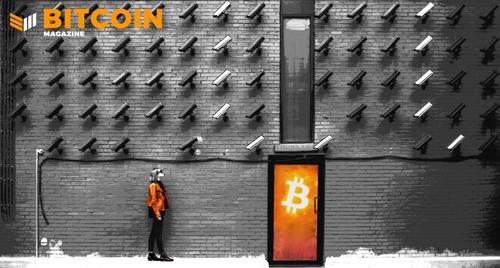(Zero Hedge) The IMF hates Bitcoin because its decentralized protocol and programmatic monetary policy defies the control the fund wants to implement on us all.
Related Why The West Can’t Ban Bitcoin The Way China Did
by Staff Writer, October 21st, 2021
The International Monetary Fund (IMF), along with a string of other financial institutions, really does not like Bitcoin. So, let’s do the usual, thinking through what the IMF is and why it even matters.
WHAT IS THE IMF?
The IMF and the World Bank are like the parallel universe versions of Shaggy and Scooby-Doo. They have no idea what they are doing, and yet the decisions they make determine how the show ends. The only difference is that no one wants to watch this version of the show, because Shaggy and Scoob keep debasing your currency into oblivion.
Sticking with the IMF alone for this article, its mandate is as follows:
“The IMF promotes monetary cooperation and provides policy advice and capacity development support to preserve global macroeconomic and financial stability and help countries build and maintain strong economies.”
For oversimplification, let’s just imagine the IMF as dictating a short- and medium-term global monetary policy. It responds to what is in front of it at any given time and “influences” global markets. This, obviously, requires a large amount of control, or centralization, if you will.
So, who makes up the IMF?
“IMF loans are funded mainly by the pool of quota contributions that its members provide.”
It’s not a secret that a bunch of rich people influence the entire globe’s monetary policy. This is public information that’s easy to find. Obviously, these guys have good reason to maintain the status quo.
So, as I said, the IMF doesn’t like Bitcoin. But why?
PREVENTING THE FOURTH TURNING
For those unfamiliar, the “Fourth Turning” is a concept that states there is a cyclical progression in society, typically with 20 years or so in each turn, the last of which results in a crisis that topples the old systems of power and ushers in a new era.
Bitcoin is often thought to be the crisis moment of the Fourth Turning by toppling the financial institutions of old (here’s a summary).
Following that track, over the past two years, the world has been rocked by a pandemic that led to the debasement of many global currencies, the U.S dollar being a very clear one, as outlined in this article by Jerry Goddard. The IMF knows all of this and has made it clear that it means to maintain control.
On July 29, an article was posted on the IMF blog, including the following quote:
“There is a window of opportunity to maintain control over monetary and financial conditions, and to enhance market integration, financial inclusion, economic efficiency, productivity, and financial integrity.”
It’s honestly kind of smug how indiscreet this statement is. Clearly, through central banks in nation states, the World Bank and other institutions, the goal of the IMF is to maintain control. In the classic Bitcoiner phraseology:” Bitcoin fixes this.”
But seriously, this is what Bitcoin was made for.
HOW DOES BITCOIN FIX THIS?
I’ll spare everyone the details of rehashing what Bitcoin is. Let’s stick to the basics:
1. Bitcoin is decentralized. There’s no group of developers, miners or businesses that can band together to manipulate the protocol. If consensus is not met, the hell with it, it isn’t happening. Understandably, the IMF, which settles short- and medium-term economic issues between countries by issuing out loans based on the currencies that it constantly has a hand in debasing, probably doesn’t want the money supply controlled by an unbeatable algorithm that makes you play the game the way Bitcoin wants to play.
2. Bitcoin has a programmatic monetary policy. We know how many bitcoin exist now, we know how many will exist in total and we know when the new bitcoin will be issued. We know all of this, and it’s publicly available to anyone willing to look. Not being able to control the supply or its issuance is a crucial concern for any central authority attempting to maintain power in the legacy system. They cannot control the protocol or the system of Bitcoin, and they cannot control the currency of bitcoin, either. These would be transparent reasons for not wanting it to succeed.
THE IMF WANTS TO INITIATE BITCOIN PANIC
“Digital money must be designed, regulated, and provided so that governments maintain control over monetary policy to stabilize prices, and over capital flows to stabilize exchange rates.”
Read that first part again: “Digital money must be designed” for government control. The IMF will claim this is for consumer protection. We hear about the impending regulations on the darkening horizon constantly.
And when discussing digital assets, the IMF made sure to speak directly on Bitcoin later on in the post:
“The least stable of the lot, which hardly qualify as money, are cryptoassets (such as Bitcoin) that are unbacked and subject to the whims of market forces.”
The only cryptocurrency named was bitcoin. (I hear you maxis, I know you don’t like us to call Bitcoin “crypto.”) It was named because it is feared. It stands before the IMF as an unstoppable algorithm designed as a relic of the new age. Debasement and financial instruments that enable it will fade to forgotten dust as a bygone age is swallowed whole, along with the financial legacy framework.
IT’S NOT JUST ABOUT CONTROL
It’s about IMF’s funding too. What happens when a governing body needs to raise capital quickly? That’s right, it issues garbage bonds. Well, what happens if other products result in larger yields in a shorter time frame, such as what is happening in the world of stablecoins and DeFi?
“Countries are concerned with several scenarios. Substantial CBDC or stablecoin demand might absorb a large share of government bonds. This could affect the yield curve, and in the case of stablecoins whose reserves cannot be lent out, the availability of collateral. And stablecoins fully backed by central bank reserves could immobilize and segregate central bank liquidity which would otherwise be freely lent between banks to satisfy daily payment shocks.”
For the United States, this is what is referred to as the “Federal Funds Rate.” This is the rate at which banks borrow money from each other or the central bank overnight to meet a reserve requirement (a percentage of the deposits you hold), each night. As you can imagine, the loss of bonds and the loss of another revenue stream via the Federal Funds Rate isn’t something any centralized player wants.
BUT THAT’S NOT ALL, FOLKS!
In December 2020, the IMF put up a post on its blog that discussed using your browser history to affect your credit score.
“As Big Techs gather data, manage customer relations through ubiquitous digital platforms (as opposed to networks of physical branches), and become essential to better design and customize financial services, they will keep an increasing share of the producer surplus.”
The IMF is ecstatic to talk to all of us about the opportunity to add every single thing we do on the internet to be calculated into our ability to get a credit card. It doesn’t want to simply have access to your finances and control that information on a global market anymore. No, that got too boring. Now, it wants to control who you are and control every digital action you make.
Can you guess if Bitcoin fixes this?
10 times more effective than ribavirin against Herpes (HSV1, HSV2), Swine flu (H1N1), Bird flu (H1N4), Pox (cowpox). Studied by the DoD for the Bioshield program. Get your Agarikon biodefense from Ascent Nutrition, one of the most pure and potent in the industry. Save 10% and get free shipping with a subscription!“I felt like I was getting a cold, but Agarikon stopped it in its tracks.”
Organic AGARIKON fights Viruses & Bio-warfare, and much more!
Stillness in the Storm Editor: Why did we post this?
The news is important to all people because it is where we come to know new things about the world, which leads to the development of more life goals that lead to life wisdom. The news also serves as a social connection tool, as we tend to relate to those who know about and believe the things we do. With the power of an open truth-seeking mind in hand, the individual can grow wise and the collective can prosper.
– Justin
Not sure how to make sense of this? Want to learn how to discern like a pro? Read this essential guide to discernment, analysis of claims, and understanding the truth in a world of deception: 4 Key Steps of Discernment – Advanced Truth-Seeking Tools.
Stillness in the Storm Editor’s note: Did you find a spelling error or grammatical mistake? Send an email to [email protected], with the error and suggested correction, along with the headline and url. Do you think this article needs an update? Or do you just have some feedback? Send us an email at [email protected]. Thank you for reading.
Source:
Support our work! (Avoid Big Tech PayPal and Patreon)DIRECT DONATION


Leave a Reply